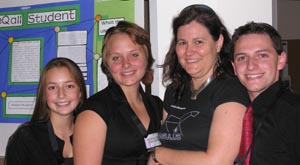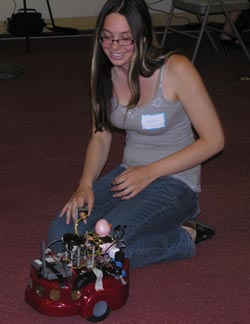Linguistics merged with computer science last week at a hands-on demonstration of spoken dialogue systems by UCSC students at NASA Ames Research Center in Mountain View.
Students from associate linguistics professor Beth Ann Hockey's Language Engineering class showed visitors how to make robots move with the sound of their voice, learn English through immersion in a virtual world, and use a telephone reminder system to manage school tasks and aid in memory retention.
"The students used the same Open Source tool kit to build their projects that we used to build the Clarissa system for the space station," said Hockey-who led the Clarissa Project at NASA, which developed the first spoken dialogue system ever used in space. The technology allows astronauts to have their hands and eyes free to concentrate on completing tasks in space, which are more complicated due to zero gravity.
Hockey said that although her students all had a solid background in linguistics, many of them began her class with no experience in computer programming. She noted that the students were given the opportunity to work with academic and commercial partners who volunteered their time to assist.
The partners included Chris Kitts, a professor at Santa Clara University and director of the Center for Robotic Exploration and Space Technologies (CREST) at NASA's Research Park; Sunil Vermuri of Q-Tech, which is known for its voice-based telephone reminder system; and Matthew Fuchs of Paideia's virtual language learning program.
Hockey's Language Engineering is the only class of its type offered at UCSC. The course is designed to give students the opportunity to learn computational linguistics-the study of building computer programs to use natural language. This is the second time Hockey has taught the class, and this marks the first year that students were able to create dialogue systems in collaboration with project partners.
Attendees at the demo included Anthony Shore, an alumnus who graduated from UCSC in 1990 with a B.A. in linguistics. Shore now works for the San Francisco branding agency Landor Associates. "We're actually using linguistics in the world for business applications," Shore noted. "I'm here to tell the students that there's life after receiving a linguistics degree; I've found that studying linguistics at UCSC has been absolutely invaluable for my career."
Contact the author at srapp@ucsc.edu.




